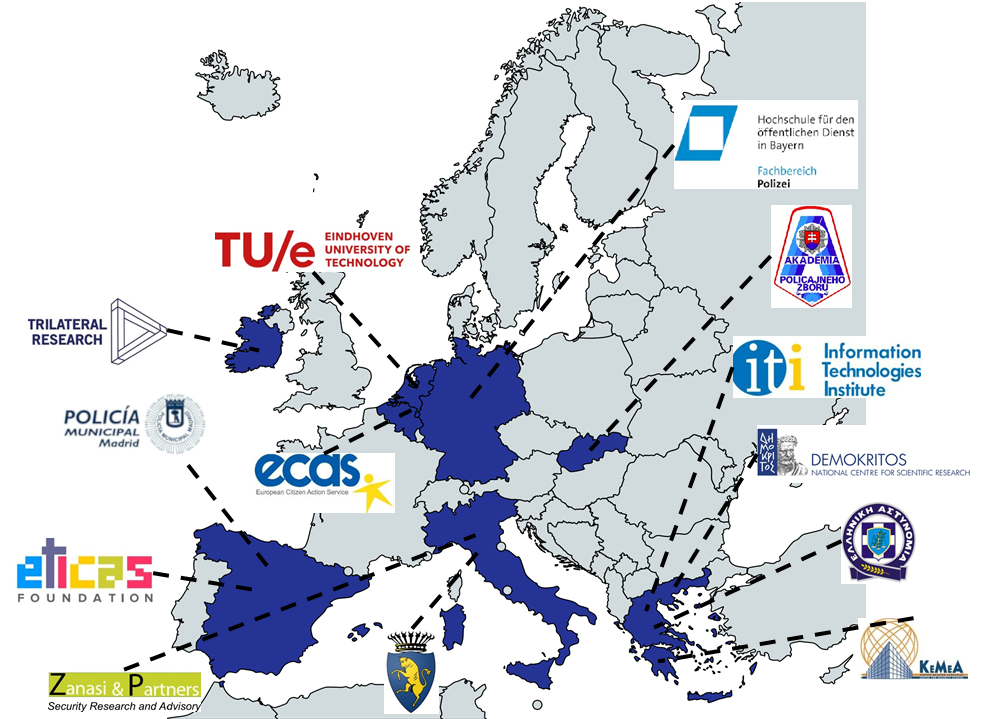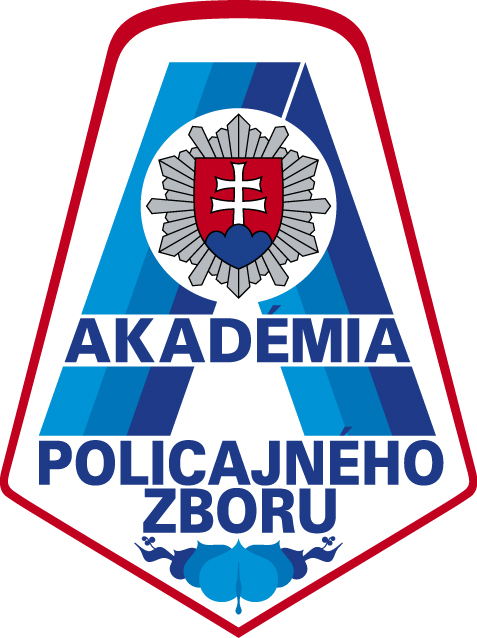The consortium
The popAI consortium consists of 13 partners from 8 European countries, which are Greece, Ireland, Spain, Italy, Belgium, The Netherlands, Germany, and Slovakia.
The consortium comprises organisations with, on the one hand, high expertise on the technical and scientific fields relevant to the objectives of popAI and, on the other hand, strong presence in the initiatives and public discourse on the ethical and legal issues tackled by the project. Furthermore, popAI involves sundry law enforcement agencies with significant experience on using advanced technologies in their processes and are strongly interested in the ethical and societal implications of technology usage in the field.

The National Centre for Scientific Research “Demokritos” (NCSRD) is the largest multidisciplinary research centre in Greece and consists of five independent institutes focusing on different scientific fields. NCSRD participates in pop AI with the Institute of Informatics and Telecommunications (IIT). An important aspect of IIT’s evolution is its major strategic decision to act as the epicentre of the NCSRD plan for fully embracing AI and data-driven science for its scientific activities. IIT has already established synergies with other NCSRD institutes, where ICT technologies have been exploited in different domains (energy, environment, security, etc.) through various research projects. IIT participates with two research groups, the coordinating group, Integrated Systems Laboratory (ISL) and the Software and Knowledge Engineering Laboratory (SKEL).
Role and main tasks in the project
NCSRD acts as pop AI project Coordinator and as such is responsible for the project management, governance and the quality control. As an expert in AI and ICT Security issues, NCSRD also contributes as a technology consultant in several other task and lead communication, AI ecosystem building in the security domain and provides the relevant pop AI ecosystem platform.
Trilateral Research Ltd is based in Ireland and has a related entity in the UK. It specialises in research and the provision of policy, regulatory and certification advice and recommendations for new technologies and systems. Trilateral has a long record of successful project involvement on the social, ethical, and legal impacts of new data practices, information technologies, an innovation. TRI has been and is a partner in more than 40 EC-funded projects, coordinating and leading several of them and focusing its work on the social, ethical, innovation and legal impacts of new and emerging technologies, and the assessment of legal, social and ethical requirements associated with new technological developments. TRI has been working with the new General Data Protection Regulation (GDPR) since 2011 and developed a team of GDPR certified research analysts experienced in Data Protection Impact Assessments and support for GDPR compliance. TRI also undertakes assessment of data governance practices in relation to law enforcement, open geo-spatial data, predictive analytics, and artificial intelligence. TRI brings to this project a combination of expertise in the privacy and data protection impact of new and emerging technologies, including AI tools, robots, drones, and big data solutions, along with experience in engaging a broad range of stakeholders, from academic research, industry and citizen groups. These strengths enable TRI to make a strong contribution towards achieving the goals of this project.
Role and main tasks in the project
TRI leads WP3 and shapes the methodological framework for stakeholder awareness and empirical impact. It contributes to the theoretical framework (WP2) as well as helps developing the final recommendations (WP4).
Eticas Research and Innovation is a well-established SME headquartered in Barcelona. It is a non-profit organisation focused on research, training and dissemination at the intersection of technology, data, society and responsibility. It intends to support decision makers in creating policies that maximise benefits of technology while minimising the negative impact, as well as technological providers to detect ethical, legal, and social implications in an early stage and to embed solutions into the technology design, with the aim to raise public awareness of the implications of digital technology and to empower individuals and communities to protect their data.
Role and main tasks in the project
Eticas is in charge of WP2, which provides the theoretical underpinning for the project scaffolding. Eticas mobilises its expertise in the practical use of AI solutions in law-enforcement contexts to advance the state of the art on how AI processes are interacting with security concerns, and what are the possible roadmaps for the next decades. Additionally, Eticas substantially contributes to other WPs to ensure knowledge integration and enhance the multi-disciplinary aspects of the projects, contributing both technical knowledge and expertise in SSH and STS.
The Center for Security Studies (KEMEA) is a think tank on homeland security policies and an established research center since 2005 within the Hellenic Ministry of Citizen Protection (former Ministry of Public Order and Citizen Protection), aiming to support security policy implementations in Greece, at a strategic level. Specifically, the activities KEMEA is involved in include: a) research and development in the context of National and European projects in close cooperation with LEAs, working under the auspices of the Ministry of Citizen Protection; b) training of practitioners in new systems and technologies; and c) the certification of practitioners in private security professions at the national level. The Center also provides advisory and consulting services to the Ministry of Citizen Protection, as well as other Public and Private authorities, on safety and security issues. A main objective of KEMEA is to bring together all national Law Enforcement Agencies (Police, Fire Service, Coast Guard, Civil Protection agency, etc.) and to enable them to collaborate, interconnecting them with corresponding agencies, research institutions and the industry from around Europe. This dedicated approach to exploring synergies, establishing communication links and working together to produce end-user driven research on all fronts of the Security Sector during the last decade, has earned KEMEA its participation in numerous National and EC R&D projects.
Role and main tasks in the project
The main role of KEMEA is to lead WP4, which is going to produce recommendations specific to policymakers, law-enforcement agencies, civil society organisations and AI developers for the ethical use of AI for LEAs.
The Information Technologies Institute (ITI) was founded in 1998 as a non-profit organisation under the auspices of the General Secretariat for Research and Technology of the Greek Ministry of Development, with its head office located in Thessaloniki, Greece. It is a founding member of CERTH since 2000. CERTH/ITI is one of the leading Institutions of Greece in the fields of Informatics, Telematics and Telecommunications, with long experience in numerous European and national R&D projects. It is active in a large number of application sectors (energy, buildings and construction, health, manufacturing, robotics, (cyber)security, transport, smart cities, space, agri-food, marine and blue growth, water, etc.) and technology areas such as data and visual analytics, data mining, machine and deep learning, virtual and augmented reality, image processing, computer and cognitive vision, human computer interaction, IoT and communication technologies, navigation technologies, cloud and computing technologies, distributed ledger technologies (blockchain), (semantic) interoperability, system integration, mobile and web applications, hardware design and development, smart grid technologies and solutions and social media analysis. CERTH/ITI has participated in more than 525 research projects and R&D contracts with the Private Sector (Industry).
Role and main tasks in the project
CERTH brings the expertise of its sceintists and experts in AI for Security domain design, focusing on correlation of AI design patterns and risks with trans-disciplinary factors. Specifically, CERTH leads Task 3.6, engaging new citizens through student photo and caption competition, thus involving volunteer campus students and from nearby Universities of Thessaloniki.
Eindhoven University of Technology (TU/e) is situated in the Eindhoven Brainport region, the technological heart of the Netherlands, and is committed to develop knowledge and innovative technologies to help solve societal challenges in the domains of health, mobility and energy.) TU/e is a research-led university specialising in engineering science & technology. Education, research and knowledge valorisation contribute to: a) science for society – solving the major societal issues and boosting prosperity and welfare by focusing on the Strategic Areas of Energy, Health and Smart Mobility; b) science for industry – the development of technological innovation in cooperation with industry; c) science for science – progress in engineering sciences through excellence in key research cores and innovation in education. To facilitate technology transfer and commercialisation of research, Innovation Lab has been created at TU/e. This service supports researchers to translate academic and technological findings into solutions that tackle key societal challenges. To date, it has successfully supervised 40 spin-off companies, 120 student companies, 60 TU/e patents, 60 patent licenses and over 500 third-party patents. The TU/e ‘ethics and philosophy’ group is a leading centre for philosophy and ethics of technology in Europe, with ca. 30 researchers in this area. World-leading centre for ethics of technology.
Role and main tasks in the project
TU/e chiefly conducts a consultant role in the context of philosophy of technology and technology ethics. In particular, TU/e team is involve in topic related to predictive policing.
Founded in 2006, limited liability company under the Italian law since 2007, Zanasi & Partners (registered brand of “Zanasi Alessandro Srl”) is a security research and advisory company active in EU and MENA areas. Z&P serves its customers by focusing on technology solutions. Its main clients include national and international public institutions – including LEAs and intelligence agencies – and leading technology companies. Its professionals and partners (former LEA officers, academic and industrial researchers) can rely on a two-fold background: security/intelligence and advanced technology skills. The company was appointed full member of ESRIF (European Security Research and Innovation Forum) in 2007, following the appointment of its founder to ESRAB (European Security Research Advisory Board) in 2005.
Role and main tasks in the project
Z&P covers a cross-sectoral role within the project. Its team undertakes research activities to guarantee that technologies developed in pop AI are compliant with ethical and data privacy requirements. Moreover, it investigates the socio-economic impact and repercussions (e.g. discrimination, cognitive biases, etc.) of the adoption of AI technologies by LEAs, including the reduction of direct and indirect costs of crime and investigation, productivity gains, the promotion of innovation and a higher sense of trust and security.
The European Citizen Action Service is an international non-profit organisation, based in Brussels, with a pan-European membership of about 140 members and 29 years’ experience. It is a member of the Liaison Group of European CSOs of the EESC and is part of Civil Society Europe. ECAS promotes a citizen-centric and democratic European Union in which citizens’ rights are at the heart of decision making at all levels and in which citizens are informed, consulted, and can actively participate. ECAS’s mission is to empower citizens to create a more inclusive and stronger European Union. ECAS works in two focus areas – ‘EU Rights‘ and ‘European Democracy‘ – implementing various EU projects, providing services (‘Your Europe Advice’ and the ‘European Citizens’ Initiative Forum’) to citizens and civil society organisations and implementing diverse innovative methods of citizen engagement in the decision making process.
Role and main tasks in the project
ECAS is a civil society no-profit organization. Its role is dedicated to facilitate access to general public and define strategies to include passive or vulnerable groups. Moreover, ECAS team is involved in the implementation of action-oriented research through citizen engagement methods and dissemination of results at the EU level. ECAS brings also its technical expertise, as a provider of crowdsourcing, social listening and policy lab platforms.
The Hellenic Police is subordinated to the Ministry of Public Order and Citizen Protection. The Hellenic Police assumed its present structure in 1984 when the Gendarmerie (Chorofylaki) and the Urban Police Forces were merged (Law 1481/1-10-1984, Government Gazette 152 A). Hellenic Police is comprised of both central and regional Services. Hellenic Police`s headquarters is the supreme authority over these Services. Its efforts centre on the fulfilment of the Force`s mission, within the framework of the Ministry of Interior`s policy. For this reason, it schedules, directs, oversees, and monitors the activities of its Services, and it ensures the necessary conditions for the exercise of its authority. In its continuous mission to serve and protect citizens, HP has responded to our times` demands and challenges by improving training, adopting a modern crime prevention policy, better utilizing science and technology and by exploiting international law enforcement cooperation.
Role and main tasks in the project
HP participates providing operational expertise, definition of needs and requirements and evaluation of results from the LEA viewpoint. HP officers contribute to the definition of realistic scenarios, the implementation of training programs to personnel and security professionals, the covering legal aspects of the proposed research and dissemination of the project results.
The Department of Police is located in Fürstenfeldbruck and in Sulzbach Rosenberg and currently trains the majority of police students in Bavaria at the campus in Fürstenfeldbruck. Students here train for their career on professional and executive levels for the Police Enforcement Service (either Police Force / Constabulary or Criminal Investigation Police Department). The University of Applied Sciences – Police Affairs (HfoeD) teaches future higher ranked police officers in various disciplines including psychology, political science and social sciences.
Role and main tasks in the project
BayHfoD mainly participates in Policy Labs and trans-disciplinary meetings, especially providing feedback on Human-Machine Interface (HMI) and organizational aspects, contributing to 2040 roadmap and evaluation/validation tasks.
Academy of the Police Force in Bratislava was established in 1992; it falls under the higher education system of the Slovak Republic and operates as a state university. The aim of the Academy is to educate and train high skilled professionals for the departments within the Police Force of the Slovak Republic, special units of the Ministry of Interior of the Slovak Republic, and for other state and non-state security services. The Academy successfully accredited two main study programmes: Protection of Persons and Property and Security-law Services in Public Administration. Both study programmes are provided in all three levels of higher education. The study programme Protection of Persons and Property is suitable for those who intent to work in the Police Force of the Slovak Republic or various security services and institutions. The study programme Security-law Services in Public Administration is suitable for graduates who intent to work in public administration. Considering the Academy is from its beginning an open university, selected optional subjects within the study programmes are offered also in English. Apart from the applicants from the Police Force of the Slovak Republic, security services and public administration, the right to study at the Academy of the Police Force has every applicant who fulfils respective requirements of the Academy. Academy of the Police Force in Bratislava is also a member of wide international networks including the participation on the activities of MEPA, FRONTEX, CEPOL and ERASMUS+. Academy of the Police Force in Bratislava has expertise in: Protection of Persons and Property, Security-law Services in Public Administration, Project Management, Training, Dissemination.
Role and main tasks in the project
Experts from APF work on tasks related to the platform and solution development and the implementation of features, while defining legal and ethical solutions for the created toll. Furthermore, APF scientific team contributes to dissemination projects results through participation in scientific conferences and publishing activities.
The City of Turin Local Police is a law enforcement agency which performs police tasks, as national police forces (i.e. Carabinieri, State Police, etc.), with a defined limit to Turin’s geographical area. With over 1,800 operating staff, Turin’s Local Police ensures compliance with the dictated laws and regulations, such as for instance, prevention and investigation of crimes, urban security, road traffic monitoring, etc. The Technological Investigations Dept. (known as the “Reparto Investigazioni Tecnologiche” – R.I.T.) is one fundamental subdivision within the Local Police bodies primarily tasked with the conduction of complex digital investigations, aimed at enhancing the prevention and prosecution framework of criminal offences and other unlawful acts. RIT is headed by Chief Commissioner Gianfranco Todesco and composed of three Deputy Commissioners in addition to ten analysts and administrative personnel. The Unit also incorporates the City’s Big Data Analysis Lab (B.D.A), the Drones Unit as well as four specialized laboratories as such: Digital Forensics Lab, Video Analytics and Biometric Lab, Data Intelligence Lab and Documental Analysis Lab. RIT focuses as well on the strengthening of security and safety policies, unpacking emerging urban phenomena and managing crowd-exhaustive events. To do that, the collection and analysis of (un)structured data (extracted from web, socials, open data repositories, IoT and multiple sensors) is done in addition to the handling and the processing of intelligent video surveillance streams complementing live monitoring of mass gatherings. Particularly, the Unit’s B.D.A processes Big Data by using innovative technologies, such as powerful virtual machines and cloud services for data mining, web crawling, natural language analysis and semantic analysis.
Role and main tasks in the project
Besides being a lead LEA with innovative AI expertise within the group, PLTO leads the AI ethics roadmap for LEAs based on the Turin AI Hub asset which complements and aligns with pop AI roadmap and sustainability planning, exchanging best practices and lessons learnt and acting also as a testbed of the forthcoming EU AI hub for LEAs.
Ayuntamiento de Madrid (ADM), Madrid City Council (in English), is a public institution whose Police Department, MADRID MUNICIPAL POLICE (PMM), an armed force of civil nature with hierarchical structure and organization under the authority of Madrid City Council.
ADM-PMM is a public body, and as a Local Police in a big city constantly our patrols are being dispatched to emergencies, many times in collaboration with either the Fire Department and/or Emergency Medical Service.
Role and main tasks in the project
The features and functionalities of the project, once developed and integrated to our systems and protocols of action, will improve in time and effectiveness in the help to our citizens.





















